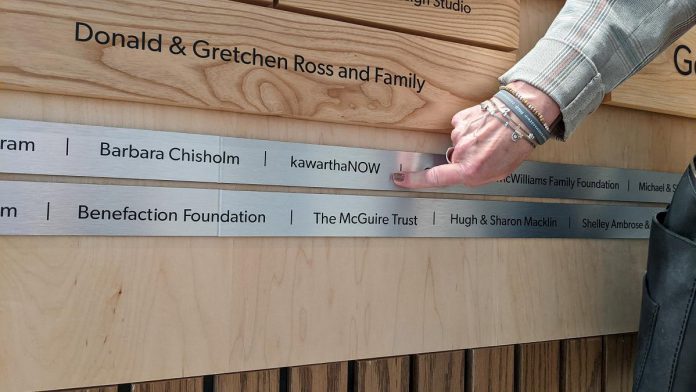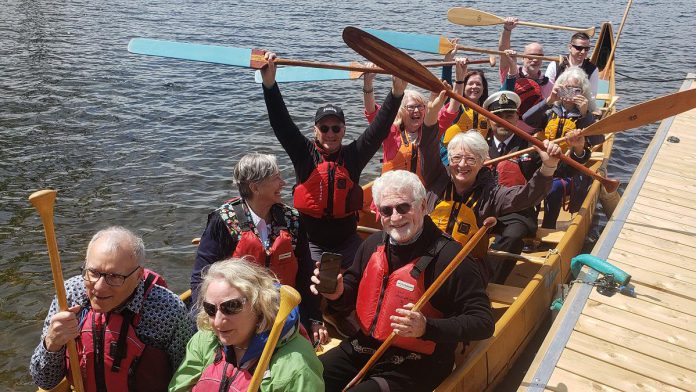
After two-and-a-half years of construction following a decade of planning challenges, the Canadian Canoe Museum celebrated the completion of its new lakefront location in Peterborough on Saturday (May 11) and, based on the reactions of the large crowd attending the grand opening, it was well worth it.
The world-class museum at 2077 Ashburnham Drive, which officially opens to the public on Monday, comprises 65,000 square feet over two storeys on a five-acre property on the shores of Little Lake and was purpose-built to house the world’s largest collection of canoes, kayaks, and paddled watercraft, with exhibitions telling the story of the canoe and a lakefront campus offering on-water and outdoor education programming.
Streamed live on YouTube, Saturday’s afternoon opening ceremony was attended by an estimated 200 invited people, including dignitaries from all levels of government — Indigenous peoples, the Crown, and federal, provincial, and municipal governments — as well as the museum’s donors, partners, members, and volunteers.
One of the dignitaries was Ontario’s Lieutenant Governor Edith Dumont who, prior to the opening ceremony, participated in paddling a Voyageur canoe around Little Lake, which departed from one of the seasonal docks that are part of the lakefront campus.
During the opening ceremony introduced and emceed by museum curator Jeremy Ward, attendees heard a written message from Governor General Mary Simon, who is a patron of the museum, and watched a video message from Prime Minister Justin Trudeau, in which he referred to the birchbark canoe owned by his father that now resides in the museum’s collection.
Lieutenant Governor Edith Dumont, who represents the Crown in Ontario, was the first dignitary to speak at the podium.
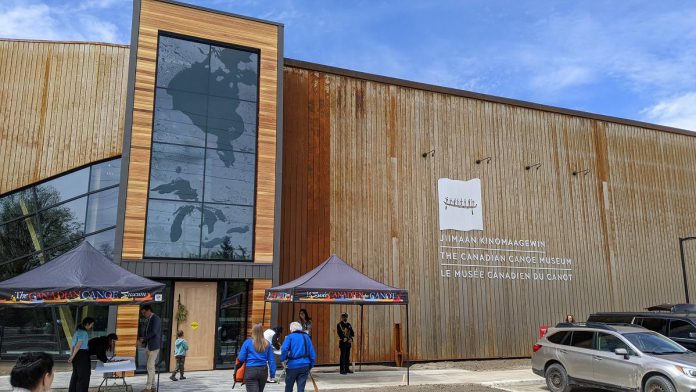
“It was a long portage bringing everything here from the old location, but I think everyone will agree this stunning facility has made the journey worthwhile,” Dumont said, referring to the move of the museum’s collection from its former Monaghan Road home.
She continued by acknowledging the artistry and ingenuity of the Indigenous peoples who invented the canoe and used it to explore and navigate the waterways they have stewarded throughout their own history, along with the shared history of English and French settlers and Indigenous peoples when it comes to the canoe.
“This museum will make it abundantly clear that, when it comes to the water and the environment, we are all in the same boat,” Dumont added. “Each one of the crafts and artificats inside this giant canoe has its own story, and it’s wonderful that some of the boats are being made available for people to take out on the water so that the canoe’s stories and our own will be woven together.”
The Lieutenant Governor congratulated museum executive director Carolyn Hyslop and her entire team for their “vision, dedication, and skill in steering through the low and high tides that are part of any project of this size.”
After the late Professor Kirk Wipper donated his immense watercraft collection in 1994 to the organization that would become The Canadian Canoe Museum, the museum opened its doors to the public in 1997 in the previous head office of the Outboard Marine Corporation at 910 Monaghan Road.
In 2014, the museum announced an ambitious plan to build a new facility on Parks Canada property beside the Peterborough Lift Lock and, the following year, launched an international design competition, selecting a winning design in 2016. A campaign to secure funds for the new museum followed. However, in 2020, a cancer-causing chemical was discovered at the intended site and the museum was forced to abandon both its plans for the location and the selected design for the new museum.
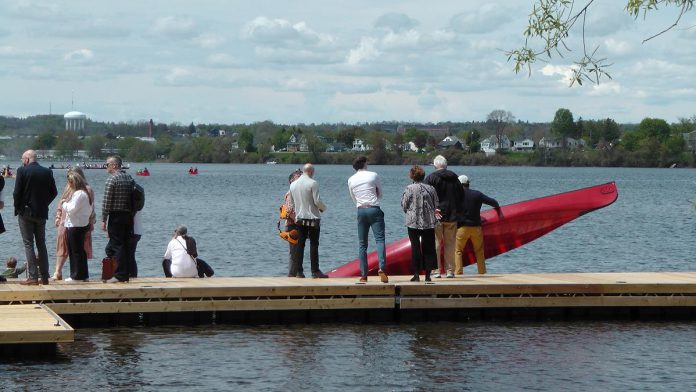
In 2021, the museum entered into an agreement with the City of Peterborough to purchase the Johnson Park property where the new museum has now been built. With a design by Unity Design Studio (formerly Lett Architects Inc.), construction began that fall but, because of labour and supply shortages due to the pandemic, the original opening date of summer 2023 was delayed by almost a year.
“Sometimes the journey we make is not the one we have planned, but it’s the one we discover we needed all along,” Dumont said, thanking the volunteers, sponsors, and supporters who helped to create “this unique and remarkable place.”
“You offer living proof that there’s no destination we cannot reach when everyone is paddling together.”
Via a recorded video, Ontario premier Doug Ford offered his congratulations on the opening of the new museum, recognizing museum founder Kirk Wipper and his passion for the canoe.
“I know he’s looking down on us today and he’s just so proud,” Ford said.
Other speakers included Curve Lake First Nation chief Keith Knott, Hiawartha First Nation chief Laurie Carr (via a recorded video), Métis Nation of Ontario president Margaret Froh, Notre-Dame-de-Grâce—Westmount MP Anna Gainey on behalf of federal heritage minister Pascale St-Onge, FedDev Ontario minister Filomena Tassi (via a written message), Peterborough-Kawartha MP Michelle Ferreri, Ontario culture, tourism and sport minister Neil Lumsden, Peterborough-Kawartha MPP Dave Smith, Peterborough mayor Jeff Leal, Peterborough County warden Bonnie Clark, Weston Family foundation chair Garfield Mitchell, and museum board chair Kevin Malone.
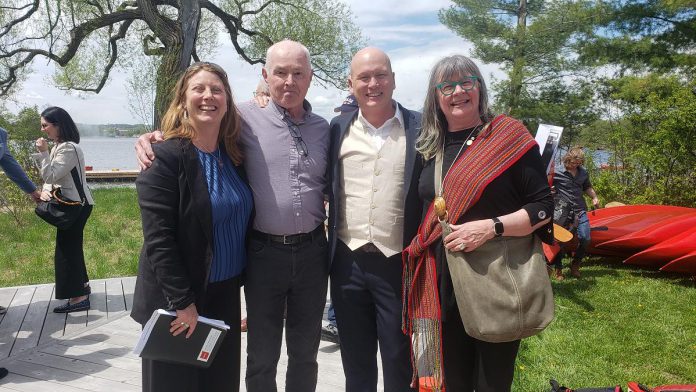
Malone noted that the Canadian Canoe Museum was named as one of the 20 best new cultural hot spots in the world for 2024 by National Geographic earlier this year, as selected by the brand’s global community of editors, writers, photographers, and explorers.
“One of the best things about visiting the world’s largest collection of canoes and kayaks?” reads the National Geographic story. “You can actually paddle up to it. The sleek, boat-shaped facility, which has its grand opening in May, is located lakeside in Peterborough (about 80 miles from Toronto by car). After goggling at the museum’s more than 600 watercraft or taking a lesson in carving paddles from Anishinaabe artists, visitors can embark from the onsite dock on a group boat tour of Little Lake.”
The final speaker at the podium was Canadian Canoe Museum executive director Carolyn Hyslop, who was greeted with cheers and a standing ovation from the crowd.
“There’s so much love in this room that I am humbled and feeling very moved,” said Hyslop. “This is probably one of the most incredible days of my life. There’s been a few, and I have joked that this (the new museum) is my third child.”
“This is a celebration of years of incredible work,” she added. “The goal was to build a home — a home for the canoes, a home for the people, and a home for the story — and, oh my goodness, I think we’ve done it. We’ve made it happen. We are in the most exquisite facility that couldn’t be more better, and this is where we are going to spend many, many more years. This is the beginning of the next chapter.”
Hyslop noted all the people who, prior to the opening ceremony, were paddling in canoes and kayaks at the lakefront campus of the museum — which was landlocked at its former location — “loving the land and loving the water.”
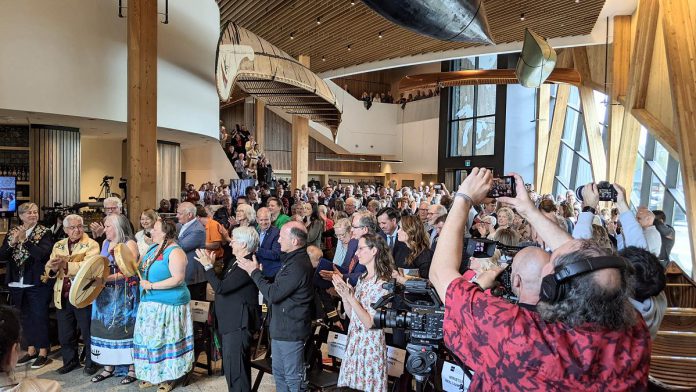
“I think those connections is where the Canoe Museum has potential for big change,” Hyslop said, before thanking the project team responsible for building the new museum, Indigenous peoples, those who contributed to the museum’s exhibitions, past and current museum boards, the museum’s staff, the museum’s volunteers, family members, and curator Jeremy Ward.
“We wouldn’t have been able to achieve this goal, this museum, if it weren’t for the transformational support at the government level, at the private level, at the individual five dollar level — it all as made this place come to reality,” Hyslop said, before sharing some “exciting news.”
“Our $45 million fundraising campaign to support this museum is fully funded. We did it. We get to start the museum with a clean slate and get going on all the work that we need to do, and there’s lots of work that still needs to be done.”
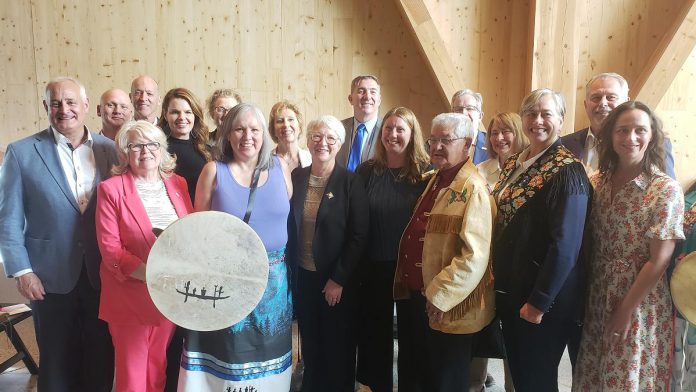
Features of the new museum include:
- An integrated Collection Hall that allows for the display of 100 per cent of the Museum’s watercraft in a Class “A” controlled museum environment, an artifact conservation standard.
- A 20,000-square-foot Exhibition Hall featuring a brand-new suite of exhibits, with the local Michi Saagig dialect of Anishnaabemowin used in the exhibits alongside English and French.
- The Lang Lakefront Campus with a canoe house, gathering circle, campfire pit, accessible boardwalk, a walk-in canoe launch, an adaptive canoe and kayak launch, and two expansive seasonal docks to accommodate on-water and outdoor education programming.
- An accessible Library and Research Room with Class “A” archival storage.
- An authentic Artisan Studio and Canoe-Building Studio to facilitate hands-on learning for adults and youth.
- A premier event rental space featuring a sweeping view of Little Lake.
- The Silver Bean Café with fireplace and adjacent Lakefront Terrace.
